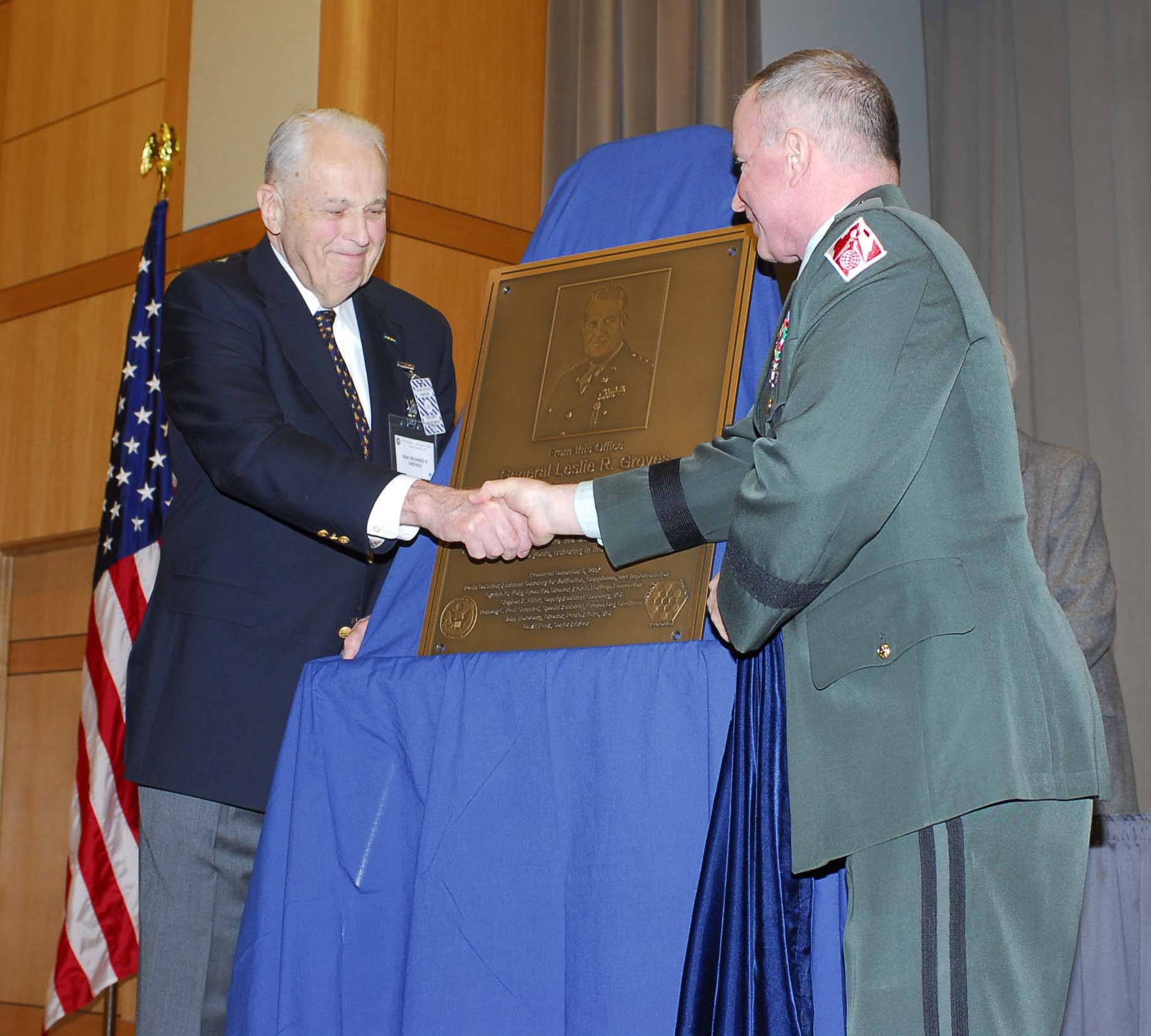On Wednesday, December 5, 2007, the Atomic Heritage Foundation presented “General Groves Day” to honor General Leslie R. Groves and his Manhattan Project colleagues and dedicate the offices where they worked throughout the war years. The event was hosted by the Bureau of Verification, Compliance and Implementation of the Department of State which now resides in the offices where General Groves and his inner circle directed the Manhattan Project.
A highlight of the day was dedication of the plaque for the Manhattan Project offices followed by tours of the offices which are usually off-limits to the public. A special lunch honored the Groves family and Manhattan Project veterans Robert Furman and Louise McAuliffe as well as many family members of other veterans.
Once Assistant Secretary Paula DeSutter discovered the historic significance of the Bureau’s office suite, she was inspired to host an event to commemorate the Manhattan Project offices and recognize the role that General Leslie R. Groves played. The Department of Energy’s National Nuclear Security Administration supported the event by funding an exhibit and documentary video entitled “General Leslie R. Groves: The Manhattan Project’s Indispensable Man.” The exhibit and video were on display in the lobby of the State Department at the 21st Street entrance, between C Street and Virginia Avenue, NW, for the event after which it will go on tour.
Attendees braved the year’s first snowfall to get to the Department of State. Traffic on I-270 made the trip from Frederick, MD a four-hour ordeal for two Manhattan Project veterans, Bob Furman and Don Ross, as well as for others. Undeterred, the veterans persisted proving once again the mettle of the Greatest Generation.
The program opened with remarks by Assistant Secretary of State Paula DeSutter, Atomic Heritage Foundation President Cynthia C. Kelly, and National Nuclear Security Administration Administrator Tom D’Agostino.
Robert S. Norris, author of “Racing for the Bomb: General Leslie Groves, the Manhattan Project’s Indispensable Man,” was the keynote speaker and provided insight into why General Leslie R. Groves. A panel featured Gwen Robinson Groves, his daughter, who talked about how she played tennis after school with the General and stayed late in his office doing homework. Ernie Graves, a longtime friend of the Groves family who also became a General, remembers how Groves used to walk several miles to work with Graves’s father. Metta Lansdale, the daughter of Col. John Lansdale also contributed her reflections on her father’s important role in intelligence operations.
Manhattan Project veteran Bob Furman spoke of a time when high-ranking officials could not believe that Groves would entrust important information with his secretary, Jean O’Leary, and insisted on posing their questions to a male staff member. Connie O’Leary Watson recalled how her mother succeeded in working with the demanding General Groves after 13 others were passed over. Mrs. O’Leary was as tough, hard-working and determined as he was and made a wonderful chocolate cake. Through these humorous and thoughtful stories, the audience gained insights into General Groves and those that he depended upon to run the Manhattan Project.
The morning program concluded with the presentation of a plaque honoring General Groves. The presentation was made by the Director of Military Programs for the Army Corps of Engineers, Maj. General Meredith Temple. The plaque was accepted by General Richard Groves, General Leslie Groves’s son and himself a former member of the Corps of Engineers.
Following the morning program, visitors were given tours of the offices in the Old War Building from which General Groves and his staff directed the Manhattan Project. It was a rare opportunity for the public to see the historic suite, now occupied by State Department, and imagine what it would have been like over sixty years ago when it was the nerve center of a project spanning the entire country.
The afternoon program focused not on the nuclear past, but the nuclear future. Robert Joseph, the former Under Secretary of State for Arms Control and International Security, Robert Smolen, Deputy Administrator for Defense Programs at the National Nuclear Safety Adminstration, and Harold McFarlane, the Deputy Associate Laboratory Director of Idaho National Laboratory, all shared their unique perspectives on what the future holds for both nuclear power and arms control.





